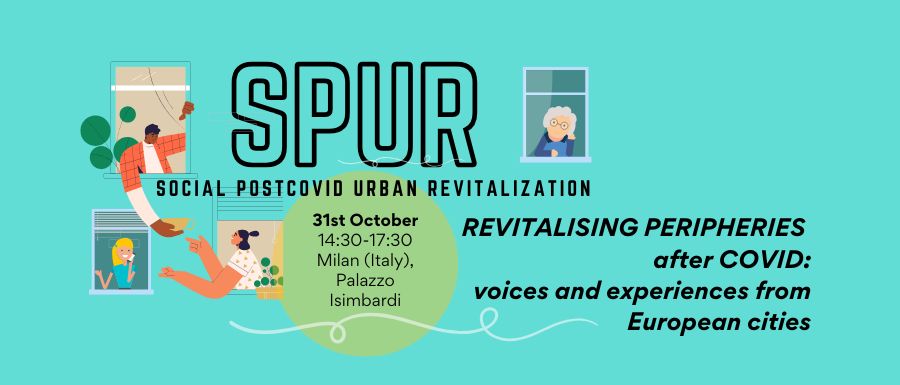The event held on October 31, 2024, in Milan (Italy) was part of SPUR – Social PostCovid Urban Revitalisation project. It represented a unique opportunity to discuss and to reflect, together with a rich panel of European cities and organisations, on initiatives and practices aimed at revitalising the suburbs after social crisis events such as the Covid-19 pandemic through processes of social integration and participation of the most vulnerable groups, mainly young people and the elderly. Through workshops, panel discussions, and shared experiences, the event showcased initiatives designed to foster social integration and community participation among vulnerable groups, focusing especially on the elderly and young people.
Day 1: needs analysis and local insights
On the first day, presentations from various cities and municipalities provided a deep look into local needs assessments conducted within the SPUR framework. Etterbeek (Brussels) noted a pressing need for intergenerational connections, particularly among migrants and youth, facilitated by activities like conversational tables and multilingual outreach. Yet, language barriers and a reluctance to revisit the topic of Covid-19 posed challenges to participation. Etterbeek’s response included creating a supportive network, where individuals of similar backgrounds, like the Polish community, could connect more comfortably.
Harghita (Romania) presented a vibrant youth response, with most survey participants being young people. Key needs focused on the social impacts of Covid-19, adaptation to new digital realities, and overcoming health and lifestyle disruptions. Participants highlighted that Covid-19 had fostered stronger family bonds for some but had also intensified mental health challenges. Best practices in Harghita have since focused on cultural and social events that strengthen connections and digital literacy, particularly for older residents.
Fondazione Comunitaria di Agrigento and Trapani (Italy) emphasised the need for community spaces, a concern amplified by the area’s high youth unemployment and migration rates. The local approach included establishing collaborative networks and a social library, transforming an abandoned space into a community hub. Here, increased social isolation and anxiety underscored the necessity for effective social inclusion and mental health resources.
Key takeaways on obstacles and enabling factors
A thematic discussion on “Obstacles and Enabling Factors” facilitated reflections across participating cities. The challenges cited included communication barriers (Etterbeek), institutional distrust (Agrigento and Trapani), and resistance to participation (Dignano). Conversely, several enabling factors were also identified, such as collaborative networks, accessible community spaces, and sustained social programs, which emerged as powerful tools to rebuild community resilience post-pandemic.
For Cinisello Balsamo (Città Metropolitana di Milano), isolation, anxiety, and distrust in institutions were particularly impactful. Young people and those living alone experienced higher levels of social disconnection. Local initiatives, such as the Legnano Civic Library and youth-focused advisory councils, are being developed to improve youth engagement, foster integration, and provide safe, judgment-free spaces.
Day 2: Workshop results and roundtable on social resilience
The second day focused on sharing results from collaborative workshops, where three main themes emerged:
- Incentives for Community Engagement – Discussions centered on designing engaging environments that blend cultural and civic experiences, such as community gatherings combining music, food, and educational elements. Participants stressed the importance of personal outreach and highlighted innovative ideas like on-site babysitting services to boost accessibility.
- Effective Resource Communication – Workshop attendees emphasised the need to communicate available resources transparently. Legitimate and accessible information, reinforced by civic ambassadors and a collaborative digital platform, was seen as essential for encouraging community participation and trust.
- Social Resilience and Intergenerational Solidarity – In the roundtable discussion, several European municipalities, including Etterbeek, Vila do Conde, and Harguita, presented perspectives on supporting social resilience. Vila do Conde (Portugal) shared two senior-focused programs: Entre Maos and Pecis, which offer workshops and social opportunities to combat isolation among seniors living in social housing. These initiatives reflect the need for interventions that foster independence and mental well-being among elderly populations.
Citizen rights in urban revitalisation
Citizen rights emerged as a central theme in urban revitalization efforts. The CERV (Citizens, Equality, Rights, and Values) program underscored the importance of integrating citizens’ voices in these projects to ensure sustainable and inclusive solutions. This citizen-centered approach fosters stronger community bonds, enhances local engagement, and encourages a shared sense of responsibility in the recovery process.
Building on shared experiences
The SPUR event provided a collaborative platform for European cities to share successful practices and reflect on new strategies for post-Covid recovery. By prioritising intergenerational solidarity, citizen participation, and transparent communication, SPUR participants are setting a precedent for urban revitalization that could serve as a replicable model across Europe.
